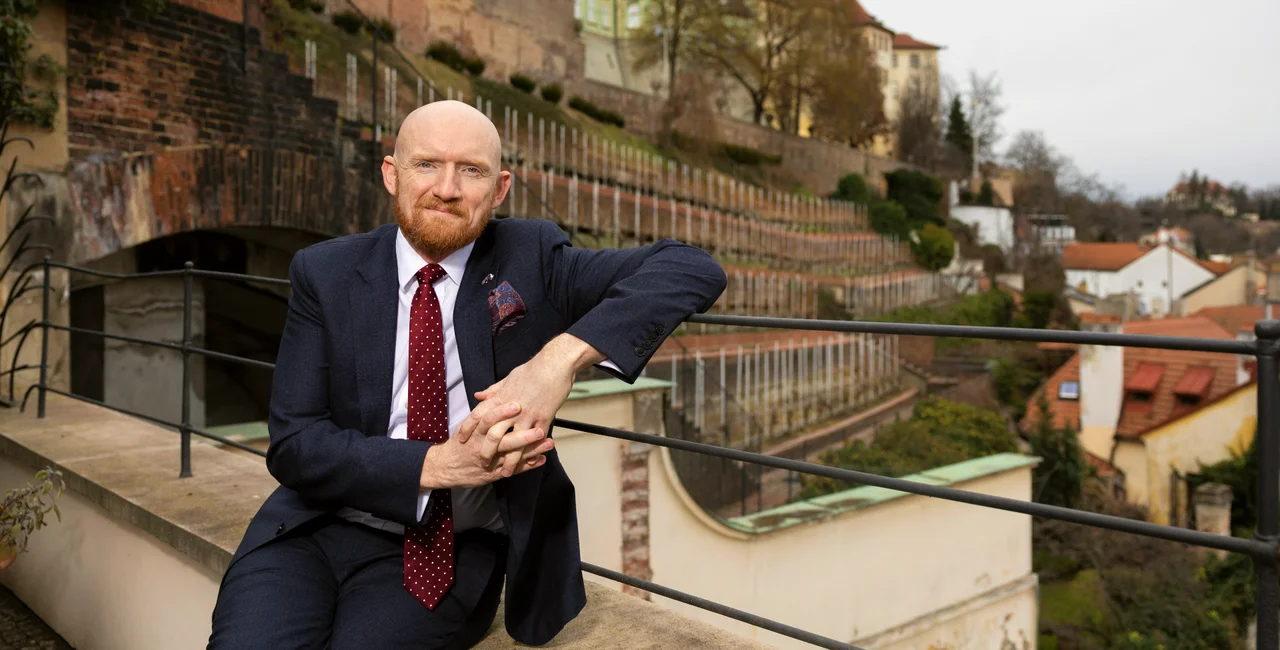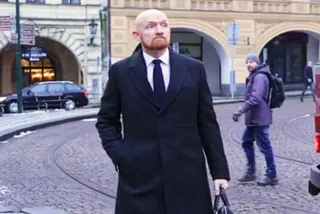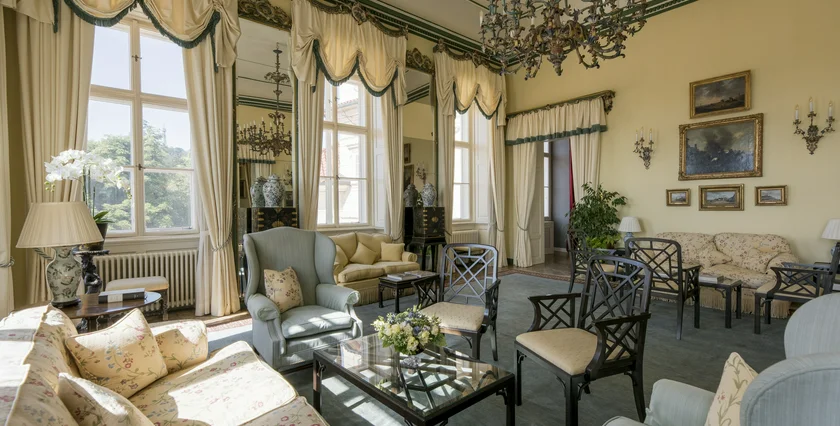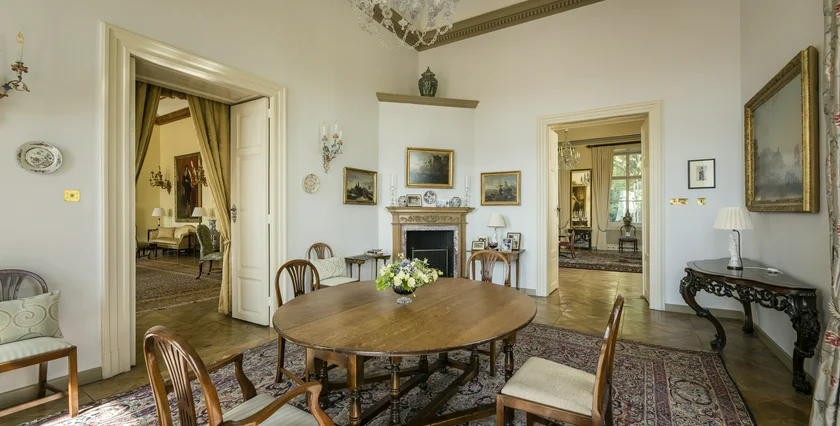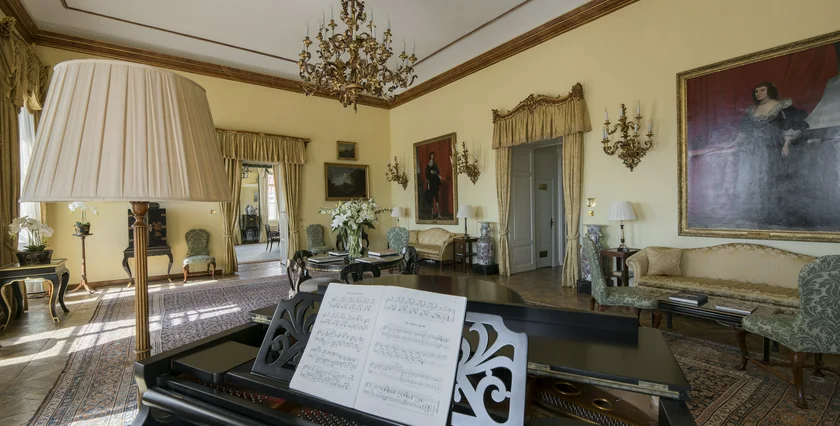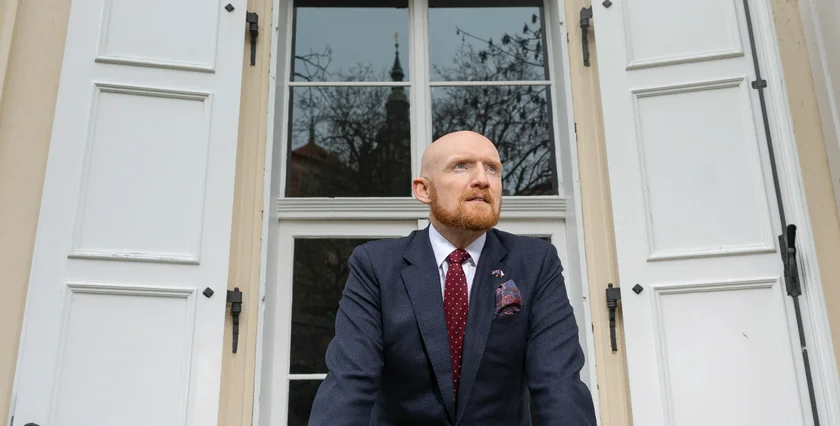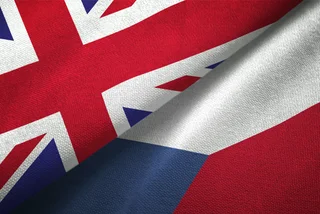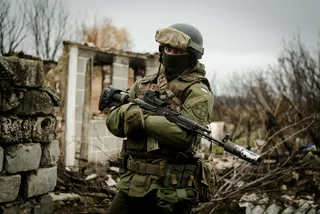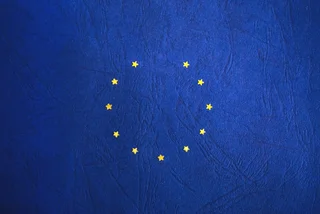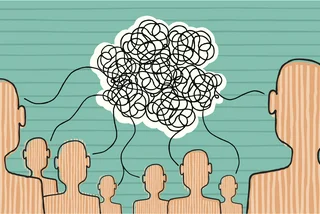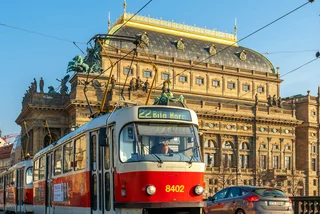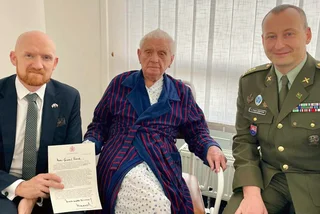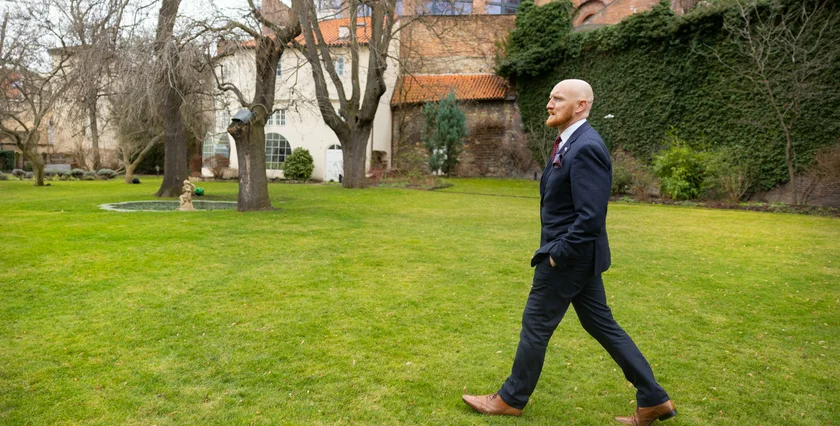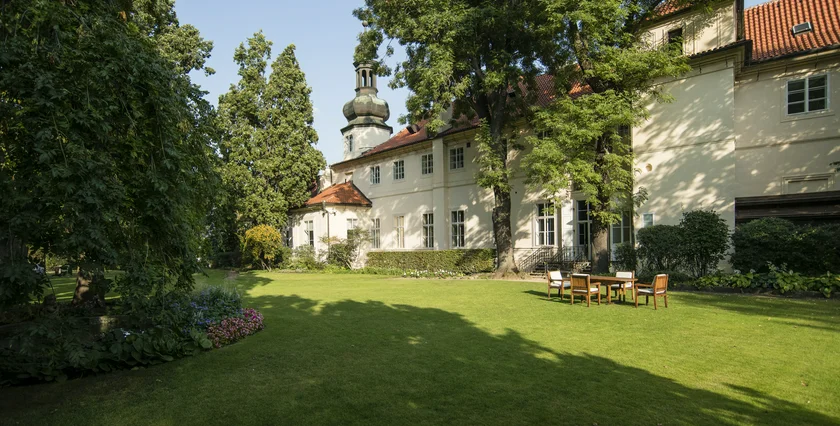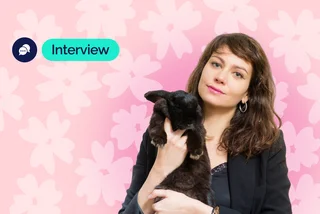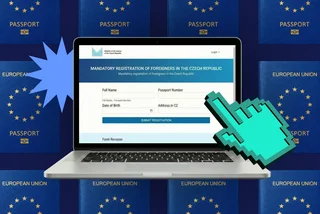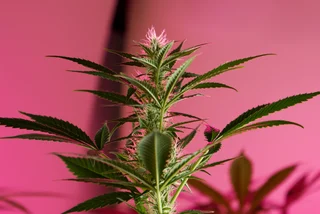The new UK ambassador to Czechia, Matt Field, is settling nicely into life in Prague. Although only three months into his role, he has established himself as a recognizable face in Czechia, attending several meetings with senior Czech politicians and even conducting media interviews in Czech.
In an exclusive meeting, Expats.cz spoke to him about how he’s finding the country so far, his thoughts on the current Czech-UK relationship, views on Czech culture, getting to grips with the Czech language, and the road ahead for Czechia and the UK.
Answers have been edited for length and clarity.
How are you enjoying the job so far?
It is fantastic - I feel very lucky to be doing this job. You won’t be surprised to learn that this is a very popular job in the British diplomatic system, and lots of people would actually like to swap places with me!
Prague and the Czech Republic certainly live up to the hype, and my family and I are very pleased to be here.
The role has been even more interesting than I expected, and I have attended lots of meetings and events. It’s certainly not a “9 to 5,” and there are many early mornings! I have quite a packed schedule at the moment.
I arrived in Prague right in the middle of the presidential election, which was fascinating.
I was able to attend the inauguration and feel the excitement and buzz of Czechia’s new start.
About the inauguration – were you able to meet President Petr Pavel?
Unsurprisingly, there were a lot of people who wanted his time. However, we did get to speak at the Concert for Ukraine event in Prague at the end of February.
The UK knows Pavel well from his time at NATO [he was head of the NATO Military Committee] and he also studied at the UK’s Royal College of Defense Studies.
He is a really like-minded partner for us, and he is very open-eyed about the challenges ahead. We have a huge amount of things in common.
Moc rádi jsme spolu s dalÅ¡Ãmi diplomaty pÅ™ijali pozvánà prezidenta Pavla a panà Pavlové.
— Matt Field (@MattFieldUK) April 5, 2023
Na setkánàs nimi jsme si připomněli dlouhou a mimořádnou historii Pražského hradu.
🇬🇧 🇨🇿 #StrongerTogether pic.twitter.com/A6XrD51PUV
How would you describe the current state of Czech-UK relations?
Czechia and the UK have a long history, dating back to before World War II. Questions have been asked whether, post-Brexit, the relationship between both countries would get more distant. However, I would say that the close ties between both nations have become even stronger in the last 12 months, since Russia’s widescale invasion of Ukraine.
Trade between Czechia and the UK has also gone up by 13 percent in the last year. Things are moving in the right direction, and my job is to continue those successes and build on them.
"Both Czechia and the UK are cooperating together to help Ukraine, we recognize that Ukraine is defending all democratic countries across Europe"
In particular, what do you hope to improve in the Czechia-UK relationship?
I would primarily focus on three things – safety, prosperity, and resilience.
Safety at the moment is mainly associated with providing Ukraine with the means to overcome Russia, but also relates to domestic cooperation between Czechia and the UK.
In mid-March, I flew to London with Interior Minister Vít Rakušan to sign an agreement between Czechia and the UK on law enforcement. We want to do more to tackle cybercrime and other emerging threats, such as terrorism and organized crime. Security, therefore, is a big topic.
Prosperity is about creating more opportunities for investment in both directions. If you walk down the streets of Prague, you’ll find lots of British brands such as Tesco and Marks & Spencer. In the UK, we’re also seeing more Czech investments, such as within our postal service and football clubs. I’d really like to continue and strengthen this.
#MarksAndSpencer je na Václavském námÄ›stà už od roku 1996 a za tu dobu si zÃskal Äeská srdce dÃky kvalitÄ› svých produktů a služeb. A už brzy se můžeme těšit na spoustu novinek!
— Matt Field (@MattFieldUK) March 24, 2023
🇬🇧🇨🇿 úspÄ›ch, který napÅ™ÃÄ ÄŒeskem zamÄ›stnává vÃce než 400 lidÃ. pic.twitter.com/sLwbFtULgl
On resilience, both countries are currently dealing with challenges around disinformation.
Both Czechia and the UK need to work hard to protect their democratic processes and combat any attacks – be they Russian or from other sources – against these. I therefore aim for more diplomatic exchange between both countries to prevent this.
Prior to starting this role, you were the UK’s ambassador to Bosnia and Herzegovina. How did that role differ from the one you have now?
Although Bosnia is geographically not very far from Czechia, the relationship [between the UK and Bosnia] is quite different. It was very challenging there. It’s a country that has major legacy issues, domestic tensions, and inter-ethnic discord, and a lot of time was spent dealing with that.
On the contrary, the UK and Czech relationship is already well-established, and is more about partnership and adding value to it.
There is a great emphasis on working together towards shared goals, such as helping Ukraine or increasing trade. The cultural links between both nations are also great: you often see the exchange of ideas in music, theater, and film that make the relationship richer and stronger. It also makes my job quite a lot of fun.
You mentioned Ukraine – in which ways is the UK, in cooperation with Czechia, assisting the country?
It’s important to remember that the UK and Czechia were two of the first countries to react decisively to Russia’s widescale invasion of Ukraine on Feb. 24, 2022.
In both countries’ cases, we immediately knew what was at stake. We had domestic experiences [of Russian aggression] following the 2018 poisoning of a former agent for British intelligence agencies in Salisbury, and the 2014 Vrbětice ammunition warehouses explosions. Both countries knew how vital it was to protect democratic countries in Europe.
BlÃzcà přátelé a spojenci. S ministrem zahraniÄà @JanLipavsky jsme reflektovali stále užšà 🇬🇧🇨🇿 spolupráci, podporu Ukrajiny, zajiÅ¡tÄ›nà bezpeÄnosti naÅ¡ich obÄanů a posÃlenà NATO.
— Matt Field (@MattFieldUK) March 28, 2023
TěšÃm se na to, Äeho spoleÄnÄ› jeÅ¡tÄ› můžeme dosáhnout.#WeAreNATO @mzvcr pic.twitter.com/0EX0V9LSbJ
Both Czechia and the UK have also received many Ukrainian refugees – it is worth pointing out that Czechia has taken in the highest amount of refugees per capita of any country. A great achievement of the past 12 months in Czechia has been the successful integration of Ukrainians into the workforce.
Both countries also continue to provide more military support – the UK is training 20,000 Ukrainians this year and Czechs have provided all sorts of assistance. London will be hosting the Ukraine Recovery Conference this June, and Czechia will send a big delegation to discuss further ways to help Ukraine.
What do you think are the top three priorities for the UK-Czechia relationship?
Assisting Ukraine is the top priority; ensuring that we help it continue to push back against Russia. Ukrainian President Volodymyr Zelenskiy has visited both the UK and Czechia, and is very appreciative of both countries’ collaboration and support.
The second priority is security. This means working on emerging and existent challenges in the cyber realm, organized crime, and hybrid threats.
The third priority is looking at ways to help Czech and British firms do more business together. After navigating the logistical challenges of Brexit, companies can see that trading together is still worthwhile. Better energy security is a clear goal, and also a topic that is interlinked with the other top two priorities. Both countries are discussing ways how they can develop their green and nuclear energy sources.
How did Brexit affect the UK-Czechia relationship?
In the first couple of years after the 2016 referendum, Brexit dominated UK-Czech relations and took up a huge amount of bandwidth in terms of communication and finalizing legal matters. I also witnessed the same as the ambassador to Bosnia.
A lot of time was also spent helping address British nationals’ questions about residency and other paperwork issues. I think that, now, we have reached a point where we have answered most queries about this, but if anyone does need any more help I advise them to look at our “Living in the Czech Republic” page on the official UK government website and consult the UK embassy Facebook page.
A message to British nationals in the Czech Republic.
— Matt Field (@MattFieldUK) January 26, 2023
For further details and our guidance, see👇https://t.co/Ie8p21maFi pic.twitter.com/o0f7r6VdIY
Now, post-Brexit, both countries have more bandwidth and scope to work together and focus on other issues, such as security and Ukraine.
One British reader recently wrote to us saying that they had not been aware of the need to exchange their paper residency card for a biometric one. Do you plan on further spreading the word on this?
This actually gives me a chance to thank Expats.cz, because we partnered last year to spread the message about biometrics. British nationals abroad tend to be very independent and don’t naturally turn to the embassy for support.
We continue to have all of the information available online and urge people to check the Living in the Czech Republic guide. I will also continue to keep getting that message out.
We noticed your impressive 'Jsem Tu Novej' video on your first day as ambassador. How is your Czech?
Můj prvnà den jako 🇬🇧 velvyslanec v 🇨🇿.
— Matt Field (@MattFieldUK) January 23, 2023
Těšà mě, #JsemTuNovej. pic.twitter.com/o0z5AMpZ10
I’ve been learning…this won’t be news to any of your readers, but Czech is a tough language! I know a Slavic language – Croatian – but I’m still finding Czech difficult. Pronunciation is one of the biggest challenges.
However, I feel it’s very important that I continue to study and work on my Czech, even though so many people speak English to a really high level here.
"Learning Czech is an expression of respect – an assumption that everybody should speak English is disrespectful"
It also helps me better understand the country I am living in and do my job better.
So far, my Czech is a work in progress, and that progress is slow, but I am really enjoying learning the language and am always looking for tips on how I can improve it.
You have been very active on social media since arriving and have posted lots of photos of Prague. Do you have any favorite spots so far?
I am at this fantastic stage of still exploring Prague and discovering new things.
I’ve been in the city before, but only as a tourist, and you see Prague very differently then.
So far, I would say my ideal start to the weekend would be strolling through Letná or Stromovka parks – I live in the embassy building in Malá Strana, so it is conveniently close to me! I’m also a fan of Petřín Hill.
ZaÅ™izuju si kancelář. PoradÃte mi, kam bych mÄ›l vyrazit? 🗺ï¸#JsemTuNovej pic.twitter.com/Uux5r5IXjr
— Matt Field (@MattFieldUK) March 7, 2023
I also enjoy going to my local pub, U Hrocha, which is a very traditional Czech pub and something of an institution for Czechs.
A great thing about Prague is the huge amount of things it has on offer.
"I harness social media and use it as a tool to ask people for their recommendations on nice spots to go, such as restaurants, theaters, or music venues"
Now I’m just beginning to get out of Prague – I was recently in Brno, where again I got some great recommendations on social media about the best places to see and visit.
There’s an awful lot still to explore, and I am very excited about that.
How is your family settling into the capital?
I am here with my wife and kids, and we are loving Prague so far. We want to continue discovering new things about the city and country.
My children are currently attending a British international school here – they are really enjoying it.
"The public transport system in Prague is better than anything else I have ever seen"
I love sending them off in the morning on the metro system here. Knowing it is safe and reliable is wonderful.
Overall, it’s been a very smooth start for us as a family. The main reason for that is because of the warm welcome we have received.
In the time you’ve been here, do you sense any cultural differences between Czechs and Brits?
I’m still forming impressions, but I would actually say I’ve noticed a lot more similarities rather than differences. People have been very welcoming here and warm – both in-person and on social media. Czechs have also very generously contributed lots of suggestions and tips on my stay in Prague.
I’ve also felt a connection partly through the history of both countries – we have similar reference points, and Czechs also know British culture and history quite well.
We both love our football and our beer too!
Na konec týdne "na jedno". Anebo na tÅ™i? ðŸ»
— Matt Field (@MattFieldUK) March 31, 2023
Na slavném Prague Beer Festivalu jsem se stavil ochutnat skvÄ›lé 🇨🇿 znaÄky a zároveň podpoÅ™it tÅ™i 🇬🇧 pivovary, které snad už brzy nabÃdnou svá piva i v ÄŒesku: @cloudwaterbrew, @SirenCraftBrew, @AbbeydaleBeers.
Festival probÃhá i zÃtra! pic.twitter.com/qLZTIaYhnF
And how do you think Czechs feel towards Brits and the UK?
I feel very lucky – I’ve heard a lot of positive feelings about the UK so far. Not long ago I was having a chat with a Czech politician, who was telling me about their love of the British band Massive Attack and that they felt a connection to the UK due to this.
Czechs seem to be familiar with the UK – whether this be due to sport, culture, history, politics, media, or anything else. There is a definite sense of cultural connection.
On a different note – do you know about the so-called secret passage in the embassy garden that leads to one of the residences in Prague Castle? Former Czechoslovakia President Tomáš Masaryk apparently used it.
I’ve heard about this secret passage, which dates back to the time of Masaryk. He allegedly used it to come to the embassy’s garden for meetings with the ambassador. I’ve yet to see it – and it sounds very Harry Potter-esque to me – but I’d love to see the president pop down for meetings from the castle, so perhaps that’s something we should work on!
One of your predecessors, Jan Thompson, used to act in theater productions in Prague. Do you plan on following suit?
Each ambassador is different, and each has different interests and hobbies. Jan was a very talented actress in Prague – however, I intend to enjoy theater productions from the seat rather than stage!
What are your opinions on the authenticity of trdelník? US Ambassador Bijan Sabet made a slight error in February.
Ha-ha! Assuming that trdelník is Czech is an easy trap to fall into and an understandable mistake to make, as was unfortunately the case for the U.S. ambassador. However, someone has already made it very clear to me that it is not a Czech tradition, despite all the signage in the center of Prague.
Speaking of ambassadors, have you had a chance to meet any of your counterparts so far?
In this early stage, I have a perfect excuse to meet lots of people! So far, I have called on the German, French, Japanese, and Canadian ambassadors, to name a few.
Great company with @CManahanIRL to celebrate #StPatricksDay - the closest of neighbours and friends.
— Matt Field (@MattFieldUK) March 17, 2023
🀠🇮🇪 🇬🇧 pic.twitter.com/D20B00nTgp
There is a very strong diplomatic community here.
And Ambassador Sabet also started his role recently – that must help?
Yes, we both started at similar times and are both new here, so that is also nice and we can help one another.
I think he’s also experienced the same warmth and reception that I have.
How do you work with ambassadors of other countries in Czechia to help the country?
We work mainly with the Czechs on how to help their country, and on topics that they judge to be the most important – coordinating support to Ukraine, for example.
Within NATO and the G7 countries, ambassadors also get a chance to meet (here or in Brussels) and collaborate on how those organizations and Czechia can best be supported.
We also have a lot of interesting cultural exchanges going on between the embassies.
📞 Volali jsme si s @AyeshaRekhi a @bijan a chceme vám připomenout, že uzávěrka soutěže Ambassador for a Day je už tuto neděli!
— Matt Field (@MattFieldUK) April 4, 2023
Hlásit se můžete pÅ™es https://t.co/xae8PmM2zu#BuÄTuNová 💪 pic.twitter.com/IxkGKusanN
In the next six months, what are the biggest projects that Czechia and the UK are working on?
The main goal is operationalizing some of the bilateral agreements that we have reached.
Last May we signed a statement of intent on security policy coordination with Minister of Foreign Affairs Jan Lipavský – we need to make sure we deliver on that.
The Czech-UK agreement on law enforcement that I was present for in London with Rakušan also needs to be implemented.
In terms of meetings, we are hoping to see President Pavel at King Charles III’s coronation [on May 6] in London, which he is invited to.
🇬🇧 a 🇨🇿 jsou v bezpeÄnostnÃch prioritách plnÄ› sladÄ›né (až po boty 👞).
— Matt Field (@MattFieldUK) March 6, 2023
DÃky @Vit_Rakusan a jeho týmu za spolupráci na ochranÄ› naÅ¡ich obÄanů pÅ™ed vÅ¡emi hrozbami, domácÃmi i vnÄ›jÅ¡Ãmi. PÅ™ÃÅ¡tà týden spolu navÅ¡tÃvÃme Londýn, těšÃm se! pic.twitter.com/s6QYyZloTQ
We also hope to see a good number of British parliamentarians coming to Czechia; we have had some already.
As mentioned before, the Czech participation in the upcoming Ukraine Recovery Conference in London is also notable.
It’s all about that steady flow of connection between people in both directions. It’s never hard to persuade people to come to Prague, and so we are often getting people to come here!
Finally, in one sentence, what do you aim to achieve during your time as the UK ambassador to Czechia?
Success would look like a relationship that makes both our countries safer, more prosperous, and more resilient.
I think we can absolutely do that in the time that I’ve got in front of me.












 Reading time: 12 minutes
Reading time: 12 minutes 